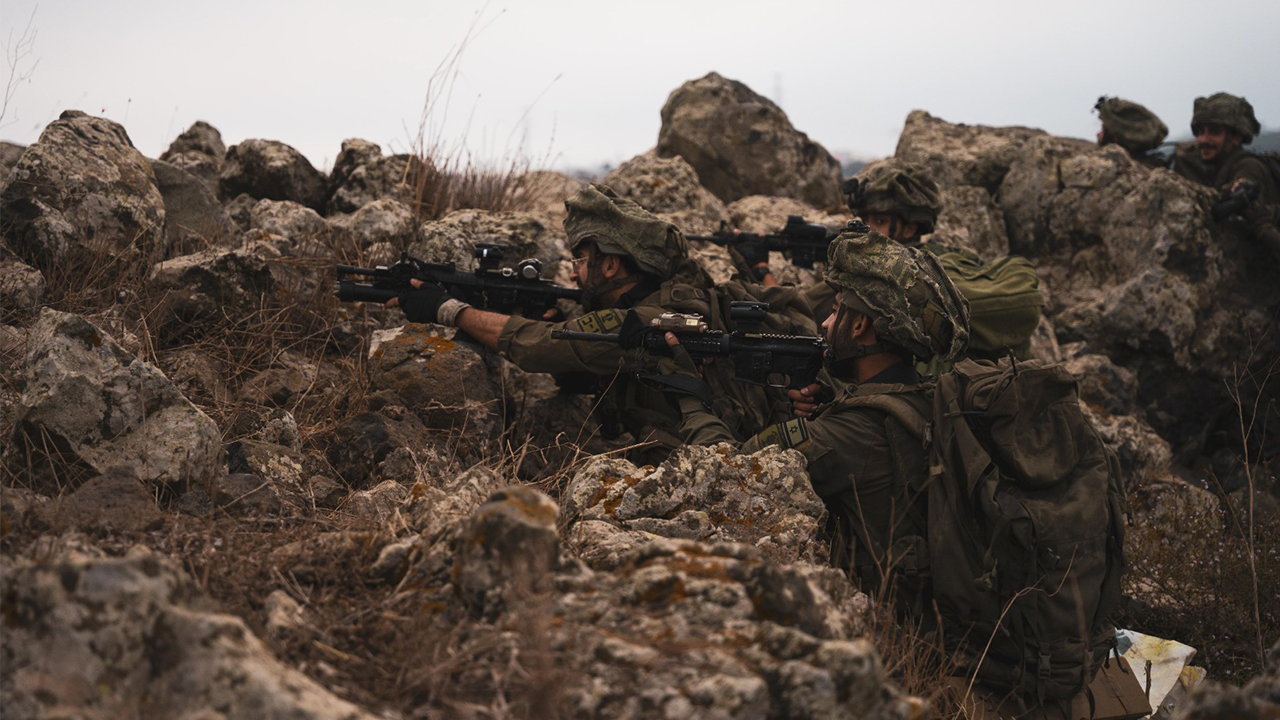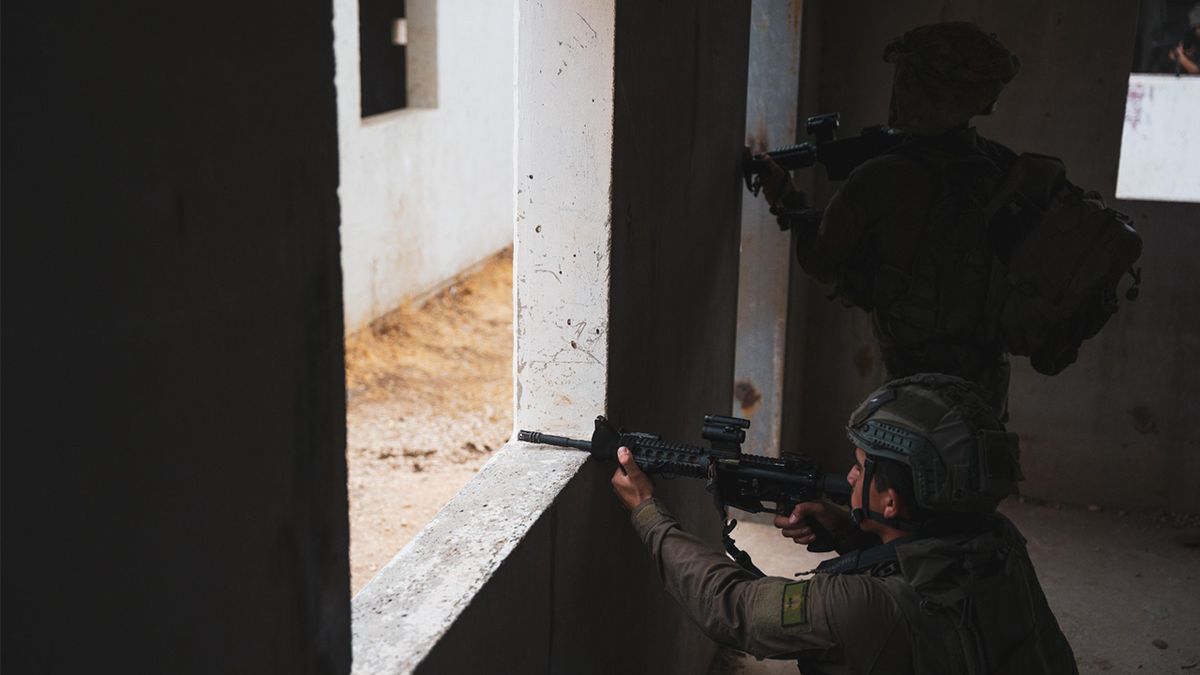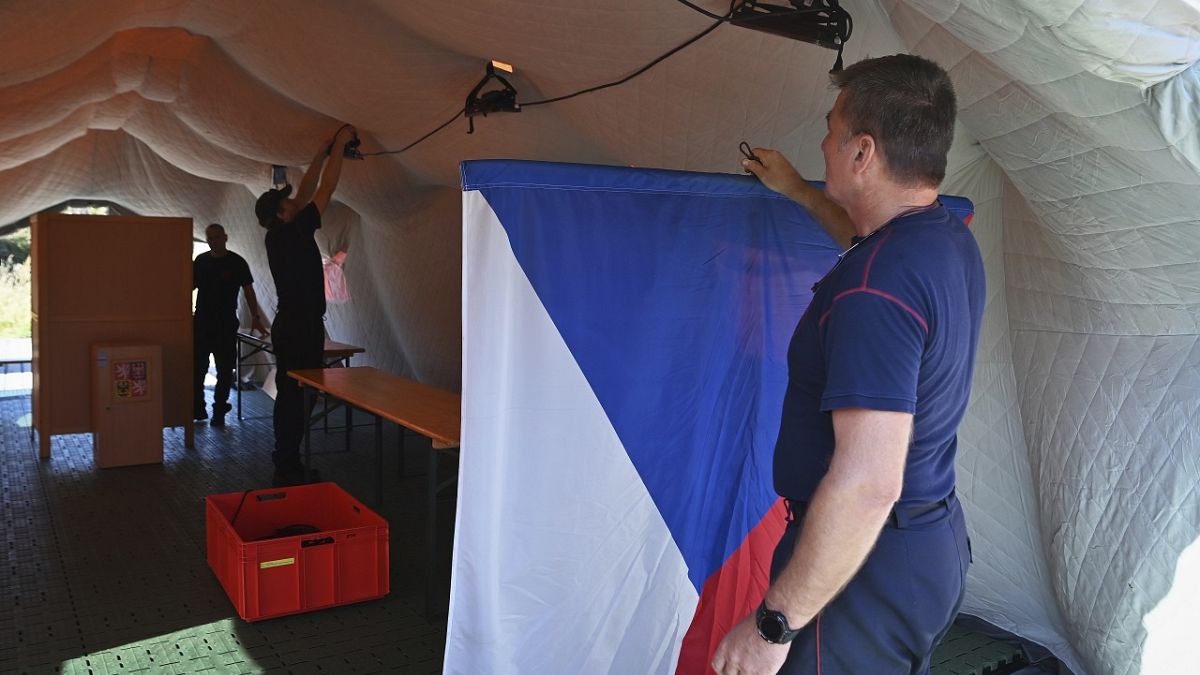World
Israeli military says regular infantry, armored units joining limited ground operation in southern Lebanon

The Israeli military announced Wednesday that regular infantry and armored units were joining what it described as its limited and localized ground operations in southern Lebanon.
This comes after Israel said Tuesday that commando and paratroop units had crossed the border in a ground operation in Lebanon, according to Reuters.
The military said that special forces units had been conducting ground raids against Hezbollah terror targets across the border for months in which tunnels and weapons were found under homes.
IDF MEETS LITTLE RESISTANCE FROM HEZBOLLAH AFTER WEEKS OF HITTING TERROR TARGETS, OFFICIALS SAY
The Israeli military said regular infantry and armored units were joining what it has called its limited and localized ground operations in southern Lebanon. (IDF)
The infantry and armored troops from the 36th Division include the Golani Brigade, the 188th Armored Brigade and the 6th Infantry Brigade.
The military adding these troops suggests that the ground operation in Lebanon has exceeded limited commando raids.
ISRAELI MINISTERS FRUSTRATED OVER US, IDF LEAK ON LEBANON OPERATION: REPORT

The infantry and armored troops from the 36th Division include the Golani Brigade, the 188th Armored Brigade and the 6th Infantry Brigade. (IDF)
The ground operation is largely designed to destroy tunnels and other infrastructure on the Israel-Lebanon border, according to Israel’s military, adding that there were no plans to widen its operation to target Beirut or major cities in southern Lebanon.
Reuters contributed to this report.

World
Prince Harry is visiting the small mountain kingdom of Lesotho, where he's called 'the warrior'
MASERU, Lesotho (AP) — Prince Harry is visiting the tiny mountain kingdom of Lesotho, where he co-founded a youth charity in 2006 in honor of his late mother, Princess Diana.
The Duke of Sussex began his visit Tuesday by meeting with young people and sharing experiences around an evening campfire. He was due to have a private event on Wednesday.
Harry, who turned 40 last month, is also due to visit Johannesburg in neighboring South Africa on the four-day trip to southern Africa, his first to the region in five years. His wife, Meghan Markle, and children Archie and Lilibet did not travel with him.
Harry co-founded the Sentebale charity with Lesotho’s Prince Seeiso initially to help young people affected by HIV/AIDS. It works in Lesotho and Botswana and has evolved into an organization that supports children and young people as they face various challenges related to health, inequality and climate.
Sentebale means “don’t forget me” in the Sesotho language, and the princes established it in memory of both their late mothers.
“We are building a force of young advocates and when they are empowered to use their voices, the strength of their impact will be immense,” Harry said to the young people and others connected to his charity gathered around the campfire. “You might not always realise how significant your influence is, but if it changes even one person’s life, it’s worth it.”
The evening event was held at a children’s center funded by Sentebale in the historic village of Thaba Bosiu, which was once the capital of Lesotho.
Prince Seeiso, 58, called Harry his younger brother, and reminded everyone that Harry had an African title that Seeiso had previously bestowed on him. Seeiso said Harry was also known as “the warrior” in Lesotho.
Harry, who was dressed casually in a puffer jacket and dark pants, smiled at the compliment.
The British prince also paid a courtesy visit to Lesotho Prime Minister Sam Matekane, who said: “Lesotho will always be a second home for Prince Harry, and we are forever grateful for his dedication.”
Lesotho celebrates its Independence Day on Friday and is also this year marking 200 years since the country was founded. Harry’s connection with Lesotho, a nation of 2.3 million completely surrounded by South Africa, began when he visited after leaving school and worked with orphaned children.
___
AP Africa news: https://apnews.com/hub/africa
World
‘We are all the same’: Lebanese come together to feed those forced to flee

Beirut, Lebanon – At Nation Station, a communal kitchen in the Geitawi neighbourhood, volunteers move to and fro, stacking food on a table.
Behind them, others stir meat, cook rice or chop lettuce while trading small talk.
“Fifty meals!”, one of the volunteers shouts out to his comrades, noting a benchmark.
They return the enthusiasm with a communal cheer, without breaking from their tasks.
The volunteers in the petrol station-turned-communal kitchen are working to prepare meals to be delivered to shelters for people who have been forced to flee their homes.
One million displaced
Before Israel began relentlessly bombarding Lebanon’s south, Bekaa Valley in the east and Beirut’s southern suburbs on September 23, more than 110,000 people had already been displaced from their homes in southern Lebanon during the 11 months of cross-border attacks.
Last Monday’s escalation forced many more to flee and the situation became even more dire on Friday when Israel levelled an entire block in a southern suburb of Beirut while assassinating Hezbollah’s Secretary-General Hassan Nasrallah and other officials from the group.
The Israeli army then demanded that large parts of Beirut’s suburbs, already reeling from the previous week’s attacks, evacuate.

In the days that followed, Prime Minister Najib Mikati said as many as one million people, or about one-fifth of the country’s residents, were displaced.
Lebanon’s Ministry of Education designated a number of schools as temporary shelters for the displaced, while the occupancy of hotels and rented apartments spiked.
But beyond that, the Lebanese state’s capacity is limited.
The country is in its fifth year of a devastating economic and banking crisis, which experts largely blame on the ruling political class.
Picking up the slack
In the space where the government, the United Nations or international NGOs fall short, initiatives like Nation Station fill the gaps.
“Nation Station started the day after the August 4th explosion in 2020,” Josephine Abou Abdo, the cofounder of Nation Station, told Al Jazeera.
“We responded to emergency needs back then and since the Israeli aggression on Monday, we’ve cooked meals for those in need.”
The volunteers cook breakfast, lunch and dinner for the displaced people, to be delivered to the shelters.
In total, they make 700 portions of food daily. To make so many meals is taxing and Abou Abdo says the group is actively seeking volunteers to help feed the displaced.
Others who aren’t part of initiatives like Nation Station have also stepped up, taking families into their homes, donating blood, or distributing water to people stranded on the highways.
‘Influencers’ in action
In Beirut’s Ramlet al-Bayda neighbourhood, some students move busily back and forth. The constant drone of the air circulation system drowns out the sound of chatter. Students are split into groups, some build boxes, while others fill them with staples like dry food, water, or cleaning supplies. Once the boxes are finished, the groups form an assembly line to pass them into a parked white van as a young man gives instructions.
Once full, the vans depart for parts of the country where the need is most desperate.
![In Beirut’s Ramlet al-Bayda neighbourhood, a group of students prepare boxes of aid for the displaced, Sept 27, 2024 [Lina Malers/Al Jazeera]](https://www.aljazeera.com/wp-content/uploads/2024/10/DSC_3642-2-1727848057.jpg?w=770&resize=770%2C514)
This initiative was started by three social media influencers, Ghena Sandid, Farah Dika, and Sara Fawaz. The trio, who have no organisation or association and have not even named their initiative, mobilised their followings to secure a free space – an underground parking garage – to organise and send out the aid.
People from abroad have also been donating money for the relief efforts. But with Lebanon’s banking system collapsing in 2019, many fundraising efforts have run into trouble getting that money to Lebanon. To circumvent that, Dika told Al Jazeera that Western Union had lifted her transfer limit.
“At first, we thought the initiative would be small with only ten to 15 people helping,” Sandid said. “That number quickly turned into around 450 students. They’ve provided aid to over 50 schools across 30 regions in Lebanon.”
‘We’re all the same’
Outside the garage, teenager Zoey Zein stood with a group of her friends. “I came to help because I want people to know there are people that are helping as long as they need.”
This mobilisation has provided aid to thousands of people, but the groups are struggling to keep up with the ever-increasing number of displaced.

“One problem we face is that at first, we needed to serve 1,000 people,” Dika said. “Now that number is at 5,000.” Dika was speaking to Al Jazeera on Friday afternoon, just a few hours before the strikes that killed Nasrallah.
Since then, the number of people forced from their homes has soared. Many have taken to sleeping in parks or by the seaside.
Down in the garage, a van’s loading area is filled with goods. The volunteers close the doors and a few climb inside. Jad Jaafar, 21, sat in the passenger seat. He volunteers about six or more hours a day. “I’m trying to help,” he said. “There are people who can’t stay in their homes, so we need to go out and help them.”
“I’m from Baalbek,” he added, referring to Lebanon’s eastern region. “Next to me is a Beiruti and a northerner, and someone from the mountain. We’re all the same.”
World
November Trial Set for Suspect in Trump Assassination Attempt
-

 News1 week ago
News1 week agoMoney for cutting-edge climate technology could dry up in a second Trump term
-

 World1 week ago
World1 week agoScholz’s SPD narrowly ahead of far right in east German state: Projections
-

 News1 week ago
News1 week agoCross-Tabs: September 2024 Times/Siena Polls in Arizona, Georgia and North Carolina
-

 World1 week ago
World1 week agoCzech main opposition party dominates regional elections
-

 News1 week ago
News1 week agoElection 2024 Polls: Texas
-

 Culture1 week ago
Culture1 week agoMichigan proved it can win ugly against USC. That’s all that matters — for now
-

 Politics1 week ago
Politics1 week agoAndrew Cuomo slams 'defund the police' movement in fiery church speech: 'Dumbest words ever uttered'
-

 Politics1 week ago
Politics1 week agoElon Musk’s pro-Trump super PAC launches website to increase canvassers in battleground states













